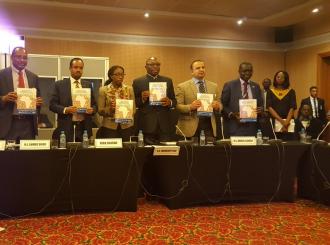
Yaounde, 01 April 2019 (ECA) – Africa’s best bet at mobilizing the revenues needed to drive its sustainable development in good time, lies in broadening and deepening its tax bases, improving tax administration, tackling tax avoidance, enhancing non-tax revenue collection, avoiding the pitfalls of tax exoneration schemes for foreign investors, shunning debt burdens with little return on investment and leveraging digital technologies for easy and cost-effective tax compliance.
This is the substance of the 2019 Economic Report on Africa (ERA 2019) launched by the UN Economic Commission for Africa (ECA) at the 52nd Session of the Commission that took place from 20 to 26 March 2019 in Marrakech Morocco [download a copy here: www.uneca.org/era2019].
The report which focuses on the theme “Fiscal Policy for Financing Sustainable Development in Africa” regrets Africa’s low ratio of taxes-to-GDP level, which stood at 21.4 per cent in 2018, largely due to its low tax capacity.
It states, for example, that collection efficiency for the value-added tax (VAT) in many African countries is reported to be lower than 50%, while property and wealth taxation remain under-tapped sources of revenue.
This state of things is hurting efforts at mobilizing resources for meeting the aspirations of the Continent’s Agenda 2063 and the targets of the global Sustainable Development Goals (SDGs).
The report therefore posits the urgent need for Governments to undertake tax reforms and address tax capacity constraints and inefficiencies, which, if well done, could boost tax revenues in Africa by 3 per cent of the continent’s GDP.
The publication’s findings bear huge significance to Central African countries, especially in terms of the limited returns on the exploitation of their vast non-renewable natural resources.
Therefore, strengthening governments’ oversight, reducing loopholes in national tax policies and applying the arms-length principle to contract negotiations could contribute in curbing tax avoidance and reducing illicit financial outflows, it argues.
Consequently, ERA 2019 reiterates previous calls made by ECA and its partners for Governments to deepen their understanding of how illicit financial flows operate at the national level, develop a national action plans that address key vulnerabilities and set up coordinating frameworks for tackling illicit financial flows.
Against this backdrop, it is most relevant for Central African countries to hearken to the call for creating tax certainty “that encourages private investment by enabling potential investors to accurately assess the tax and compliance costs associated with an investment over its lifetime.”
In this regard, three Central African countries: Congo, Equatorial Guinea and Sao Tome & Principe are credited by the report to have received more foreign direct investment in natural resources sectors due to the greater tax certainty in their extractives sector than in other countries in the region.
The report’s findings on fiscal and public debt sustainability are particularly relevant to Central Africa given that countries of the CEMAC zone are facing debt servicing challenges, as a result of the macroeconomic instability triggered by the drop of commodity prices in 2014.
Chad, for instance, is said to be among Africa’s five debt distress countries.
The ECA report proposes that such countries take action to better manage public debt by: improving tax collection, borrowing with more favorable terms and rebalancing their fiscal policy framework.
“We are very excited about the clear recommendations of ERA 2019 that in many ways complement and supplement the recommendations of the 34th session of the Intergovernmental Committee for Experts for Central Africa (ICE), convened by our Office in N’Djamena, Chad in September 2018,” noted Antonio Pedro – Director of the Commission’s Central Africa Office.
“It also speaks to the serious brainstorming we are having ahead of our 35th ICE session which will focus on the stakes, opportunities and challenges of the digital economy in Central Africa, as it clearly makes a case to digital technology as a boon, rather than a bane to: improving financial inclusion, raising the effectiveness of tax administration and better linking tax payers to the state,” Pedro added.
He made reference to the empirical evidence in the report of how Rwanda (an ECCAS member-State) increased revenue collection by 6 per cent of GDP by introducing e-taxation and how South Africa used online tax payments to reduce compliance cost by a whopping 21.8 per cent while lessening the time to comply with the value-added tax by 21.8 per cent, saying “that’s one of the ways to go for Central Africa, where we shall engage governments and the private sector to internalize the practical recommendations of this well researched report in the ERA series.”
-ENDS-
Issued by:
The Sub-Regional Office for Central Africa
UN Economic Commission for Africa (ECA)
P.O. Box 14935 Yaounde, Cameroon
Tel: (+237) 222504348 / 222504315 / 222504321
Email: sroca@uneca.org
Media Contacts
Abel Akara Ticha – Communication Officer
Tel: 237 222504348